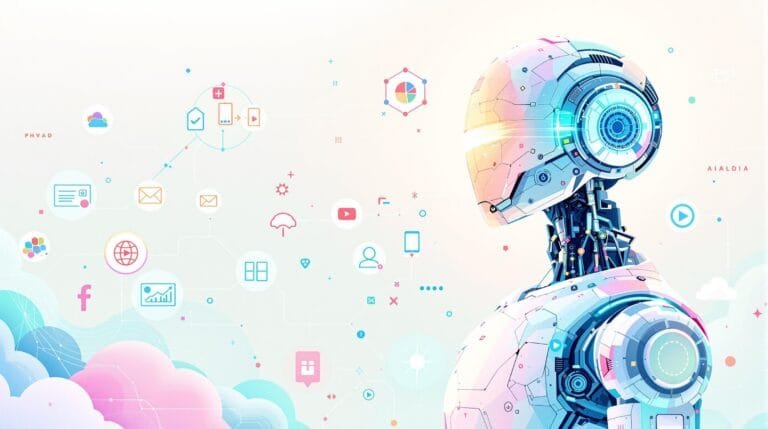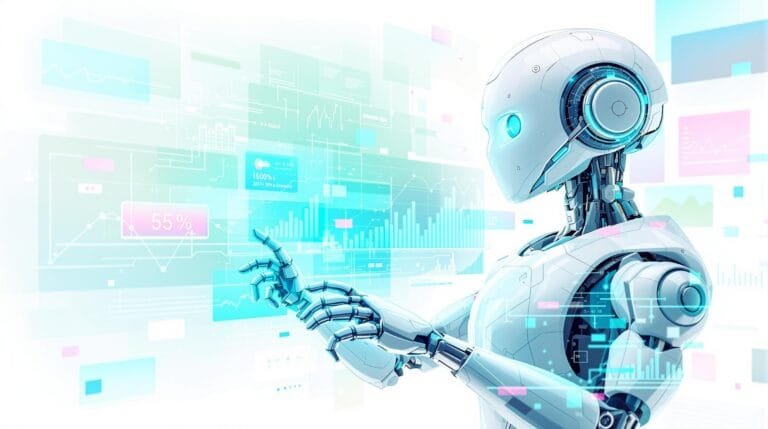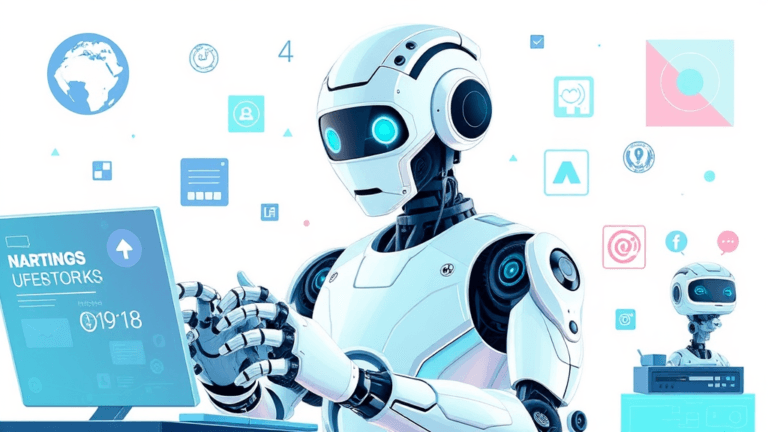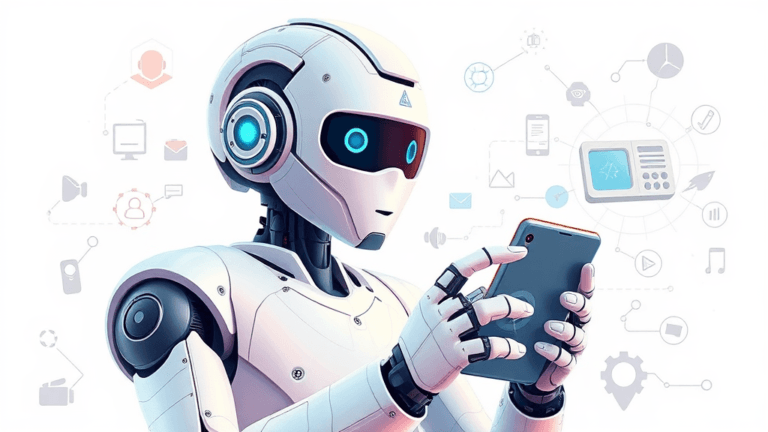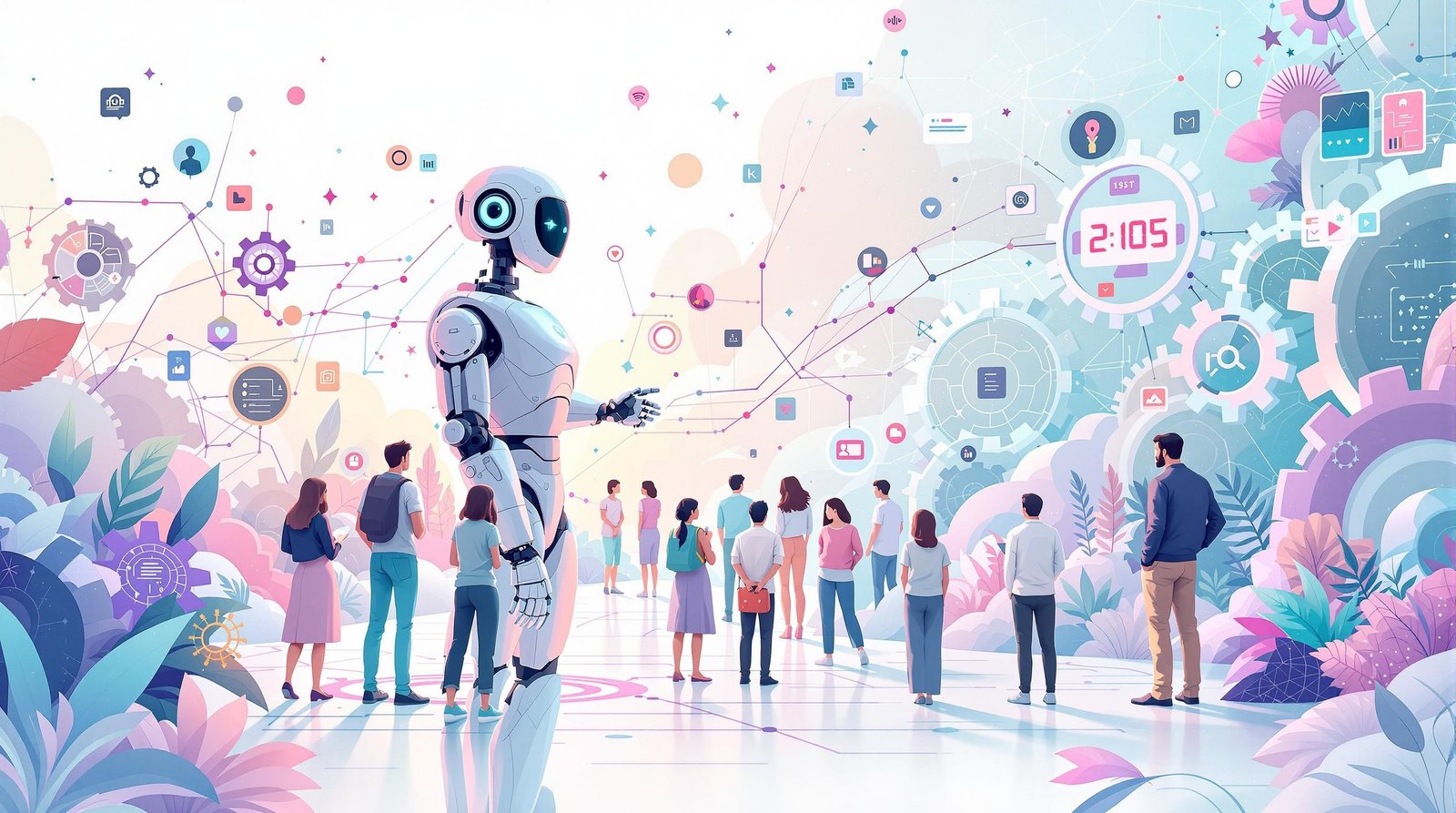
Customized AI Solutions for Modern Businesses: The Future of Smarter Workflows
Estimated reading time: 11 minutes
Key Takeaways: Why Custom AI Isn’t Just a Nice-to-Have
- Industry Expertise Matters: Off-the-shelf AI often fails because it doesn’t “speak” your business’s language.
- Start Small, Scale Smart: Pilot projects minimize risk while proving ROI.
- Support Is Non-Negotiable: Choose partners who fix issues faster than a barista on espresso.
- Flexibility Fuels Growth: Modular AI adapts as your needs evolve.
- The Future Is Collaborative: AI will augment teams, not replace them.
Table of Contents
- What Exactly Is AI Automation for Businesses?
- Tailored Automation Systems: Because One Size Fits None
- Building Blocks of Killer Automation Software
- Rolling Out AI Automation Without the Headaches
- Real-World Wins: Custom AI in Action
- What’s Next for AI in Business? Hint: It’s Wild
- Choosing Your AI Partner: It’s Not Tinder, But Close
- Criteria for Choosing the Best AI Partner (Hint: It’s Not Just About the Code)
- Case Studies: Tailored AI That Delivered Jaw-Dropping ROI
- Tomorrow’s AI: Hyper-Personalization, Crystal Balls, and Robot Handshakes
- Key Takeaways: Why Custom AI Isn’t Just a Nice-to-Have
- Conclusion: Your Competitors Aren’t Sleeping—Are You?
- FAQs: Your Burning Questions, Answered
Imagine walking into a local bakery where the owner greets you by name, already knows your favorite pastry, and suggests a new flavor based on your last purchase. That’s the magic of customized AI solutions—except instead of pastries, businesses are using these tools to predict customer needs, streamline operations, and outpace competitors. Whether you’re running a tech startup or managing a retail chain, AI isn’t just a buzzword anymore—it’s your new secret weapon.
As competition intensifies, 72% of organizations now prioritize AI automation for business to cut costs, boost efficiency, and deliver personalized customer experiences. But here’s the catch: off-the-shelf tools often miss the mark. That’s where tailored systems come in. Let’s explore how businesses are leveraging these innovations to transform workflows, one algorithm at a time. AI Automation For Business Success
What Exactly Is AI Automation for Businesses?
AI automation services are like having a digital Swiss Army knife. They use artificial intelligence to handle everything from crunching sales data to answering customer queries—all without human intervention. Think of it as hiring a team that never sleeps, never takes coffee breaks, and learns from every task it completes. How AI Can Save Your Business Time And Money Through Automation
Why Businesses Are Racing to Adopt AI-Powered Solutions
- Bye-Bye, Busywork: Automating repetitive tasks (like invoicing or inventory updates) saves employees 6+ hours per week, according to Rippling.
- Smarter Decisions, Faster: AI analyzes mountains of data to spot trends humans might miss. For example, it can predict which products will sell out during holidays or flag supply chain risks before they escalate.
- Costs? Slashed: Companies using AI-powered business solutions report 20-30% reductions in operational expenses, thanks to fewer errors and faster workflows (MSOE).
But here’s the kicker: not all automation is created equal. A generic chatbot might frustrate customers, while a tailored system trained on your specific data can resolve 80% of issues without human help.
Tailored Automation Systems: Because One Size Fits None
Ever tried wearing someone else’s shoes? That’s what using generic AI feels like for businesses. Tailored automation systems are designed to fit your unique processes, whether you’re a hospital scheduling surgeries or a manufacturer optimizing delivery routes. How AI Agents For Business Are Revolutionizing The Modern World
Full AI Automation vs. Baby Steps
| Approach | Best For | Pros | Cons |
|---|---|---|---|
| Full AI Automation | Large enterprises with complex needs | End-to-end efficiency, unified data insights | High upfront cost, longer deployment |
| Partial Automation | SMEs testing the waters | Low risk, quick wins | Limited long-term scalability |
For example, a mid-sized e-commerce store might start by automating inventory tracking (saving 15 hours weekly) before scaling to AI-driven customer support. As Kaizen Insights notes, gradual adoption minimizes disruption while delivering measurable ROI.
Flexibility is key. A custom system can adapt when your business pivots—unlike rigid off-the-shelf software. Imagine tweaking your AI’s priorities as easily as updating a Netflix playlist.
Ready to ditch the one-size-fits-all approach? Explore Our Custom AI Solutions.
Building Blocks of Killer Automation Software
Not all automation software is worth your time. The best tools feel like a well-oiled machine—quietly powerful and effortlessly intuitive. Here’s what to look for:
Non-Negotiable Features for AI Technology
- Plays Well With Others: Seamless integration with your existing CRM, ERP, or legacy systems. No one wants a tool that requires 10 new logins.
- Simple Enough for Interns: If your team needs a PhD to navigate the dashboard, adoption will flop.
- Grows With You: Scalable solutions handle 10x more data without crashing—critical for fast-growing businesses.
- Insights You Can Use: Advanced analytics turn raw data into actionable steps, like identifying underperforming products or predicting staff shortages.
Take Zendesk’s AI, which reduced ticket resolution time by 40% simply by routing queries to the right department (Zendesk). Or Camunda’s process automation tools, which helped a logistics company cut shipment delays by 25% (Camunda).
Rolling Out AI Automation Without the Headaches
So, you’re sold on AI automation services—but where to start? Follow this battle-tested roadmap:
Step 1: Play Detective with Your Workflows
Audit your processes. Where are bottlenecks hiding? Maybe your sales team spends hours updating CRM entries, or accounting drowns in manual reconciliations.
Step 2: Partner with AI Whisperers
Choose vendors who’ve solved similar challenges. Ask for case studies—like how a custom AI model slashed a retailer’s returns by 35% through better sizing recommendations. AI Automation Services Game Changer
Step 3: Test Drive with a Pilot
Launch a small-scale project, like automating employee onboarding. Measure metrics like time saved and error rates before expanding.
Step 4: Tweak, Tweak, Tweak
Use real-time dashboards to monitor performance. One healthcare client adjusted their AI’s diagnosis accuracy from 78% to 94% in three months by feeding it new data weekly (RTSLabs).
Pro Tip: Train your team like you’re launching a new product. Even the best AI fails if employees don’t trust it.
Stuck at step one? Let’s Map Your AI Strategy Together.
Real-World Wins: Custom AI in Action
Let’s ditch the theory and talk results. Medallia, a customer experience firm, used AI to cut IT response times from days to seconds (Moveworks). How? Their system auto-prioritizes tickets based on urgency and past solutions.
Or consider a logistics company that reduced fuel costs by 12% using AI-optimized delivery routes. The algorithm factors in traffic, weather, and even driver preferences—proving that full AI automation isn’t just for tech giants.
What’s Next for AI in Business? Hint: It’s Wild
The future of AI technology for businesses is like watching a sci-fi movie unfold. Think:
- Hyper-Personalized Marketing: AI that knows your customer’s favorite color before they do.
- Self-Healing Supply Chains: Systems that automatically reroute shipments during storms or strikes.
- AI Teammates: Imagine a digital colleague that attends meetings, takes notes, and reminds you to follow up with clients.
As ABBY predicts, the next wave will blend AI with IoT and blockchain for unbreakable, real-time data flows.
Choosing Your AI Partner: It’s Not Tinder, But Close
Finding the right provider for customized AI solutions is like dating—you want someone who listens, adapts, and doesn’t ghost you post-launch. Look for:
- Industry-Specific Chops: A healthcare AI guru might flop in manufacturing.
- 24/7 Support: Because even the smartest AI hiccups at 2 AM.
- Transparent Pricing: No hidden fees for updates or scaling.
And remember, the goal isn’t to replace your team—it’s to give them superpowers.
This blog post is the first half of our deep dive into AI-driven business transformation. Stay tuned for part two, where we’ll tackle overcoming implementation hurdles and measuring ROI.
In the meantime, schedule a free AI audit to spot low-hanging opportunities in your workflows.
Criteria for Choosing the Best AI Partner (Hint: It’s Not Just About the Code)
Imagine hiring a chef who’s only ever made pizza to handle sushi night. It’s possible—but why gamble? Similarly, selecting the right AI-powered business solutions partner requires matching expertise to your industry’s unique flavor. Whether you’re in healthcare or heavy machinery, customized AI solutions thrive when built by teams who speak your language. AI Customer Service Agent Revolution
Industry Expertise Isn’t Optional
A fintech AI whiz might flounder in manufacturing. Why? Compliance rules, data types, and workflows differ wildly. Take healthcare: an AI model predicting patient no-shows must comply with HIPAA and factor in variables like chronic conditions—something a retail-focused vendor might overlook. According to TechTarget, industry-aligned partners deliver 40% faster ROI by avoiding costly missteps.
Key Questions to Ask Providers:
- “Show me a case study in my sector.”
- “How do you handle compliance in [your industry]?”
- “What’s your process for learning our jargon and workflows?”
Support: The Safety Net You Can’t Skip
Even the sleekest AI hiccups. Picture a chatbot freezing during Black Friday—would your vendor troubleshoot in real-time or leave you on hold? Look for tailored automation systems backed by 24/7 support. A Netguru survey found businesses with round-the-clock vendor support resolve issues 3x faster than those without.
Scalability: Today’s Prototype, Tomorrow’s Powerhouse
A bakery’s inventory AI built for 100 SKUs won’t handle 10,000. Scalability hinges on two factors:
- Architecture: Cloud-based systems adapt easier than on-premise setups.
- Modular Design: Adding features shouldn’t require rebuilding from scratch.
BotsCrew notes that 78% of enterprises prioritize modular AI to accommodate future pivots.
| Provider Trait | Why It Matters |
|---|---|
| Industry-Specific Case Studies | Reduces learning curve and integration snags |
| 24/7 Technical Support | Minimizes downtime during critical moments |
| Modular Architecture | Allows cost-effective scaling over time |
Ready to find a partner who gets you? Book a Free AI Strategy Session.
Case Studies: Tailored AI That Delivered Jaw-Dropping ROI
No fluff—let’s break down how full AI automation transformed real businesses.
Leidos: 3,000 Hours Saved Monthly (Yes, Really)
This IT services giant struggled with chaotic support requests. Employees wasted hours routing tickets manually. Their fix? An AI system trained on historical data to auto-categorize and prioritize issues. Results:
- 3,100 hours reclaimed monthly—enough to launch three new projects.
- 92% employee satisfaction hike (happy teams = less turnover).
- Bonus: The AI flagged recurring issues, prompting proactive system fixes (MoveWorks).
Medallia: From Days to Seconds in IT Response
Medallia’s IT team drowned in low-priority tickets (“My keyboard’s unplugged”). Their tailored automation system learned to:
- Auto-resolve 65% of issues via self-service guides.
- Escalate critical failures (server outages) instantly.
Outcome: IT response times plummeted from days to seconds for urgent cases, saving $2.3M annually (Digital Adoption).
Patterns in Success Stories:
- Started with high-pain, low-risk processes (IT, HR).
- Measured ROI religiously before scaling.
- Chose vendors with proven vertical expertise.
Tomorrow’s AI: Hyper-Personalization, Crystal Balls, and Robot Handshakes
Hold onto your keyboards—the next wave of AI technology for businesses is wilder than a Tesla factory tour.
Hyper-Personalized Experiences: “We Know You Better Than Your Spouse”
Imagine a CRM that drafts emails in your prospect’s favorite slang. Or a fitness app adjusting workouts based on your sleep data and Spotify playlists. Customized AI solutions are evolving to craft experiences so personal, customers feel understood—not creeped out.
Predictive Analytics Gets a Sixth Sense
Today’s AI predicts next quarter’s sales. Tomorrow’s will forecast market shifts from Reddit threads and satellite images. For example:
- Supply Chain AI: Analyzing weather patterns and political tweets to reroute shipments pre-crisis.
- Retail Algorithms: Spotting viral TikTok trends to stock products before demand spikes.
According to ABBY, these “context-aware” models will reduce forecasting errors by 50% by 2026.
| Future Trend | Business Impact |
|---|---|
| Emotion-Sensing AI | Real-time customer sentiment adjustments |
| AI + IoT Integration | Predictive equipment maintenance in factories |
| Blockchain-Backed Data | Tamper-proof supply chain audits |
The Rise of AI Teammates (No, They Won’t Steal Your Job)
Tomorrow’s AI won’t just automate tasks—it’ll collaborate. Think:
- A marketing bot suggesting headlines during brainstorming sessions.
- An HR assistant nudging managers to check in on stressed employees.
As Harvard Business School notes, the goal is augmentation, not replacement.
Curious how to future-proof your AI strategy? Explore Our Next-Gen Solutions.
Conclusion: Your Competitors Aren’t Sleeping—Are You?
Let’s be blunt: customized AI solutions are now table stakes. Whether it’s slashing IT costs by 40% or predicting customer churn before it happens, businesses leveraging AI automation services are pulling ahead—fast.
The kicker? Implementation is easier than you think. Start with one high-impact process, partner with experts who’ve walked your path, and scale as wins pile up.
Don’t play catch-up.
FAQs: Your Burning Questions, Answered
- What industries benefit most from AI automation?
All sectors—healthcare, retail, manufacturing—but tailored solutions are key. A one-size-fits-all approach fails. - How long does AI implementation take?
Pilots take 4-8 weeks. Full deployment varies by complexity. - Can small businesses afford customized AI?
Yes! Scalable models let SMEs start cheaply and grow investments. - Will AI replace our team?
No. It handles grunt work so your team focuses on strategy and creativity. - What’s the biggest implementation mistake?
Skipping employee training. Even genius AI fails if people don’t trust it. - How do we measure AI success?
Track time saved, error reduction, ROI, and employee/customer satisfaction. - Can AI integrate with legacy systems?
Absolutely—modern APIs connect seamlessly with older software. - What if our needs change post-launch?
Modular systems allow updates without rebuilding from scratch. - Is data security a risk?
Reputable vendors encrypt data and comply with industry regulations. - Why choose Pure AI Solutions?
We offer industry-specific expertise, 24/7 support, and scalable solutions designed for your growth.

